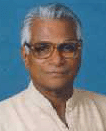| George Fernandes (Born 1930) |
|
He is known as 'the giant killer.' Avowedly socialist and left-leaning, George Fernandes, is now ironically a minister in the right-wing Bharatiya Janata Party government -- one of the many contradictions of Indian politics. Elected to the Lok Sabha for the seventh time, he has been a Union minister thrice.
|
|
Fernandes was born in a poor Christian family on 3 June, 1930 in South Kanara district of Mangalore, Karnataka. After receiving his early education here, he moved on to Mumbai in search of a job. Here he came face-to-face with the harsh realities of life. With no job in hand and no place to stay, he had to sleep virtually on the streets like scores of other vagrants in India's commercial capital. Eventually, he got a job as proofreader in the Times of India.
|
 |
Here, he got actively involved in trade union activities which made him immensely popular in labour circles. Fernandes' political career, which spans more than three decades, took off in the early sixties after he became a trade union leader in Dr Lohia's Samyukta Socialist Party in Mumbai.
Soon, Fernandes started gaining recognition among the working class as a champion of their rights. He entered the Lok Sabha in 1967 for the first time after defeating veteran Congress leader SK Patil. The fight between Fernandes and Patil was likened to the David-Goliath battle as Patil commanded immense resources -- both financial and human. But Fernandes managed to defeat the Congressman, and in the process earned the title of "giant-killer."
Working hard and with integrity and honesty, Fernandes soon spawned many trade unions in Bombay such as that of the municipal workers, cabbies and the BEST employees' union. It may be a matter of pride for him that these unions have gained in strength and still remain all powerful in Bombay, which is also the financial capital of India. Fernandes is remembered for leading the longest-running strike of the railways in 1974. He was President of the All India Federation of Railwaymen then.
A strong advocate of 'Swadeshi', Fernandes' controversial decision as Janata Party's industry minister in the Morarji Desai cabinet of 1977 forced the exit of multinational giants, Coca-Cola and IBM from India.
Fernandes continued in the Janata Dal for some time. Laloo Prasad Yadav had emerged as front-runner of the Janata Dal in Bihar. Owing to differences with the Janata Dal leader in Bihar, Fernandes floated the Samata Party along with Nitish Kumar, currently Union minister for railways.
However, this time round, he departed from his professed ideological moorings and tied-up with the Bharatiya Janata Party to become the defence minister. True to his nature, he is already mired in controversy, first, by declaring that China is India's "Enemy Number One" and then with the sacking of India's naval chief Admiral Bhagwat.
Fernandes has also written some books including, 'What Ails the Socialists', 'Railway Strike of 1974' and 'George Fernandes Speaks'. His special interests include human rights, civil liberties movements, anti-nuclear and environmental campaigns. Highly paradoxical then that India went in for nuclear testing during his tenure as defence minister.
Despite the ironies and contradictions of political life, the giant killer's simplicity and straightforwardness is liked by one and all, making him a popular minister.
|
|
| |
| Category filed under: Political |
|
|